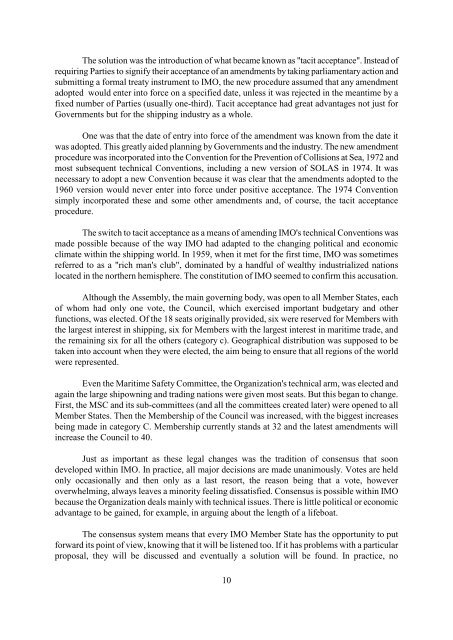wmd 1998 background document.pdf - IMO
wmd 1998 background document.pdf - IMO
wmd 1998 background document.pdf - IMO
You also want an ePaper? Increase the reach of your titles
YUMPU automatically turns print PDFs into web optimized ePapers that Google loves.
The solution was the introduction of what became known as "tacit acceptance". Instead of<br />
requiring Parties to signify their acceptance of an amendments by taking parliamentary action and<br />
submitting a formal treaty instrument to <strong>IMO</strong>, the new procedure assumed that any amendment<br />
adopted would enter into force on a specified date, unless it was rejected in the meantime by a<br />
fixed number of Parties (usually one-third). Tacit acceptance had great advantages not just for<br />
Governments but for the shipping industry as a whole.<br />
One was that the date of entry into force of the amendment was known from the date it<br />
was adopted. This greatly aided planning by Governments and the industry. The new amendment<br />
procedure was incorporated into the Convention for the Prevention of Collisions at Sea, 1972 and<br />
most subsequent technical Conventions, including a new version of SOLAS in 1974. It was<br />
necessary to adopt a new Convention because it was clear that the amendments adopted to the<br />
1960 version would never enter into force under positive acceptance. The 1974 Convention<br />
simply incorporated these and some other amendments and, of course, the tacit acceptance<br />
procedure.<br />
The switch to tacit acceptance as a means of amending <strong>IMO</strong>'s technical Conventions was<br />
made possible because of the way <strong>IMO</strong> had adapted to the changing political and economic<br />
climate within the shipping world. In 1959, when it met for the first time, <strong>IMO</strong> was sometimes<br />
referred to as a "rich man's club", dominated by a handful of wealthy industrialized nations<br />
located in the northern hemisphere. The constitution of <strong>IMO</strong> seemed to confirm this accusation.<br />
Although the Assembly, the main governing body, was open to all Member States, each<br />
of whom had only one vote, the Council, which exercised important budgetary and other<br />
functions, was elected. Of the 18 seats originally provided, six were reserved for Members with<br />
the largest interest in shipping, six for Members with the largest interest in maritime trade, and<br />
the remaining six for all the others (category c). Geographical distribution was supposed to be<br />
taken into account when they were elected, the aim being to ensure that all regions of the world<br />
were represented.<br />
Even the Maritime Safety Committee, the Organization's technical arm, was elected and<br />
again the large shipowning and trading nations were given most seats. But this began to change.<br />
First, the MSC and its sub-committees (and all the committees created later) were opened to all<br />
Member States. Then the Membership of the Council was increased, with the biggest increases<br />
being made in category C. Membership currently stands at 32 and the latest amendments will<br />
increase the Council to 40.<br />
Just as important as these legal changes was the tradition of consensus that soon<br />
developed within <strong>IMO</strong>. In practice, all major decisions are made unanimously. Votes are held<br />
only occasionally and then only as a last resort, the reason being that a vote, however<br />
overwhelming, always leaves a minority feeling dissatisfied. Consensus is possible within <strong>IMO</strong><br />
because the Organization deals mainly with technical issues. There is little political or economic<br />
advantage to be gained, for example, in arguing about the length of a lifeboat.<br />
The consensus system means that every <strong>IMO</strong> Member State has the opportunity to put<br />
forward its point of view, knowing that it will be listened too. If it has problems with a particular<br />
proposal, they will be discussed and eventually a solution will be found. In practice, no<br />
10
















